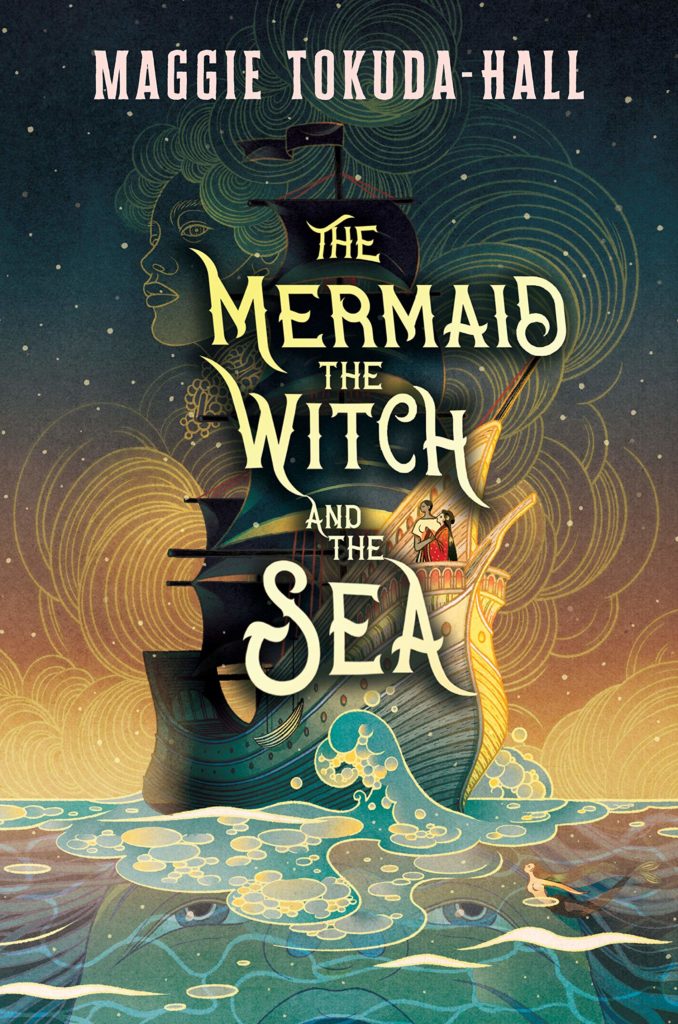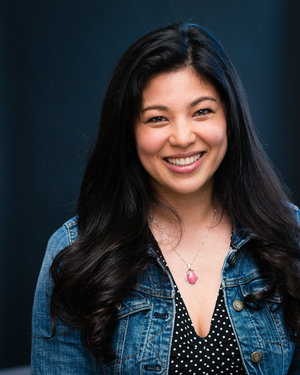The Mermaid, the Witch, and the Sea has to be one of my favorite fantasies of 2020, if not ever! If you love queer stories, pirate stories, and stories about characters who have to defy expectations, check it out. I was so excited when Maggie agreed to do an interview for me. Keep reading to see all the questions I have immediately after finishing.
The Mermaid, the Witch, and the Sea

A desperate orphan turned pirate and a rebellious imperial daughter find a connection on the high seas in a world divided by colonialism and threaded with magic.
Aboard the pirate ship Dove, Flora the girl takes on the identity of Florian the man to earn the respect and protection of the crew. For Flora, former starving urchin, the brutal life of a pirate is about survival: don’t trust, don’t stick out, and don’t feel. But on this voyage, as the pirates prepare to sell their unsuspecting passengers into slavery, Flora is drawn to the Lady Evelyn Hasegawa, who is en route to a dreaded arranged marriage with her own casket in tow. Flora doesn’t expect to be taken under Evelyn’s wing, and Evelyn doesn’t expect to find such a deep bond with the pirate Florian.
Soon the unlikely pair set in motion a wild escape that will free a captured mermaid (coveted for her blood, which causes men to have visions and lose memories) and involve the mysterious Pirate Supreme, an opportunistic witch, and the all-encompassing Sea itself.
Find The Mermaid, the Witch, and the Sea on Goodreads, Amazon, Indiebound, Bookshop.org & The Book Depository.
Author Interview
One of the things I loved about this book is that the title is what you see is what you get. Was it always the same title? I love it so much and even more so after finishing the book!
I’m so glad you like the title! We almost changed it a bunch of times. The original title was Flora and Evelyn, but then Flora and Ulysses came out while I was writing it, and I thought, jeez, I’m not trying to bat against Kate DiCamillo. Plus there’s the added issue of Flora not being Florian’s only name. I like the title we landed on, for a couple of reasons. One, it is like you say, exactly what the book has to offer. But also because it’s a bit of a nudge to The Lion, The Witch and The Wardrobe, which is a portal fantasy told from a particularly colonist’s perspective. And since this book is so much a commentary on colonialism, I liked that the title references that so that it can more effectively subvert it.
Florian and Evelyn are such fabulous characters and I love them so much. Can you talk about what it was like to write Florian’s character and especially the self-discovery Florian undergoes throughout the book?
Florian was a really hard character to write because they exist within the gender binary, in a way, but find a fluid place of being there. And writing that was really hard, because I wanted to be thoughtful about not devaluing the experience of trans people, or nonbinary people who exist completely outside of the gender binary. That was one of the reasons the Pirate Supreme is nonbinary. Their gender identity exists completely outside the idea of man or woman, so that it’s clear that in this world, as in ours, being nonbinary can mean a lot of different things.
Evelyn has a pretty contentious relationship with her parents. Did you always know that was a part of Evelyn’s character from the beginning?
Yes. I think if you have a character who’s meant to rebel against a patriarchal system, that starts with a rebellion and a distance from the parents. She needed to be betrayed by authority from the get go so that it’s more plausible when she rebels on a much larger scale. One thing I worry about with this book is that her experiences with homophobia will be triggering to queer readers. I hope that the conclusion of the story justifies that choice in the earlier chapters, but my heart is with anyone who reads up until her parents are terrible and says, I just can’t. That’s a completely valid emotional reaction, and I would just want to tell those readers that there’s a whole world of adults out here who cherish them for exactly who they are.
Can you talk about what the Sea means to this book and your writing of it? We know that some action occurs on the sea, but it’s also so much more than that.
I would LOVE to talk about the Sea! Always. Firstly, I have a fascination with the ocean and everything it represents: boundless opportunity, mystery and danger. The unknowable. It’s sort of sexy in that, because it’s so fathomless and deep and scary and cool.
The idea to make the Sea a sentient character in this book comes from kind of a left field place– my mother’s hobby is to pull invasive non-native plants from California state parks, to reduce fire risk (California is a fire climate, so our native plants “know” how to handle being lit aflame once a year), and also to allow for native bugs and animals to thrive. And this idea of nature having proprietary knowledge– how to cope with fire, what plants go best with what animals, etc– was an intriguing one to me. It’s like nature has a memory. And so the Sea and her memories, the mermaids, started to take shape for me. And the idea that human intervention and carelessness and desire disturbs that, such that nature cannot regulate itself in the way it is meant to was upsetting and intriguing to me as well. It relates to the idea of colonialism in that it belies a terrible arrogance and disrespect for what already exists in the face of consumption and greed. And so thematically, I thought it fit with this story.
The Mermaid, the Witch, and the Sea talks about stories, the power of belief, and telling one’s story. Was this theme in the book from the beginning? Can you discuss more about your opinions on the power, and magic, of telling your story?
The idea of stories defining us is something I think about constantly. And so it wasn’t there, exactly, from the very beginning as the means through which magic functions in the book, but it was there thematically. When I revised the first draft I rewrote the entire 2nd section with the Witch, and made the magic of story more explicit. I was thinking a lot at the time about the stories nations tell themselves, and that we tell about our leaders, and the power those stories have. It was right after Trump was elected, after all, and this erroneous story of himself as a business man, as a champion of the working people, was so potent despite being completely unfounded in reality. Stories are powerful, no matter their truth. They shape nations, they save and destroy lives. And that was becoming deeply clear to me while I was writing this book.
Did your writing process have to change from your picture book to writing this YA story?
In some ways. Writing a novel is more a marathon than a sprint, so it required a daily discipline I can thank my husband for helping me develop. But the craft goals are the same. And in that way, a picture book is a lot harder, because it has to do all the work of a novel in 500-1500 words. There were definitely days when I was drafting The Mermaid The Witch and The Sea when I nostalgic for writing picture books, but they were fleeting. Picture books are really hard, because they’re so exact so every little change has huge effects. The tinkering never ends. Novels are hard because they’re so long, and still there are sections I wish I could tinker around with now. Writing is hard, is my point.
Are you looking forward to any upcoming LGBTQIA+ releases?
AM I. First of all, always. The Cemetery Boys by Aiden Thomas (BRUJERIA need I say more?), Surrender Your Sons by Adam Sass, the cover reveal of K.M. Sparza’s next book is supposed to go live at any moment. Charlie Jane Anders has a YA coming out next year that I read an early version of and ADORED. I’m reading When We Were Magic by Sarah Gailey right now and I’m savoring every single word in it. Also, it’s not an upcoming release but if there are still humans who haven’t read Juliet Takes a Breath by Gabby Rivera out there, I highly recommend you do so.
I saw on your website you’re an amateur baker, is there a specific baked good you would pair with this book?
I love to bake macarons. It’s not a great bake for right now, because you really need to be able to give them away– no single household needs a whole batch of macarons, especially one with a diabetic in it, which unfortunately is the case in my home. But I think this is a complicated book with a lot of rules and some very delicate people and situations, and macarons are a bake with a lot of rules and some very delicate steps, so. Macarons. I use the Tasty recipe, with a pinch of cream of tartar added. I love that recipe because it’s so easy to tweak, so you can do a million iterations of it.
Find The Mermaid, the Witch, and the Sea on Goodreads, Amazon, Indiebound, Bookshop.org & The Book Depository.
About the Author

Maggie Tokuda-Hall is the author of the Parent’s Choice Gold Medal winning picture book, Also an Octopus, illustrated by Benji Davies, and the young adult novel The Mermaid, The Witch and The Sea.
She lives in Oakland, California with her husband, son, and objectively perfect dog.
She has a BA in Studio Art from Scripps College, and an MFA in Writing from University of San Francisco.
One thought on “Interview with Maggie Tokuda-Hall”